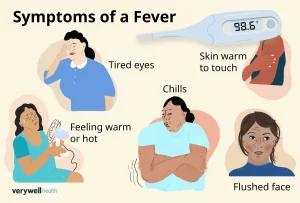Overview
Diagnosis
To determine the cause of a fever, your healthcare provider may perform several evaluations, including:
-
Asking questions about your symptoms and medical history
-
Conducting a physical examination
-
Taking nasal or throat samples to test for respiratory infections
-
Ordering tests such as blood tests or a chest X-ray, depending on your symptoms and exam findings
In very young infants, especially those two months of age or younger, a fever can signal a serious infection. In such cases, your baby may need to be admitted to the hospital for closer observation, testing, and treatment.
Fever of unknown origin
When a fever lasts for more than three weeks—either continuously or intermittently—and no clear cause is found, it is referred to as a fever of unknown origin. In this situation, your healthcare provider may refer you to specialists from different medical fields for additional testing and evaluation.
Treatment
For mild or low-grade fevers, your healthcare provider may not recommend medication. Slight elevations in body temperature can help your immune system fight infection by reducing the number of microbes in your body. However, fevers above 102°F (38.9°C) can cause discomfort and may require treatment.
Over-the-counter medications
If your fever is high or causing discomfort, your healthcare provider may recommend nonprescription medications such as:
-
Acetaminophen (Tylenol and others)
-
Ibuprofen (Advil, Motrin IB and others)
Use these medications only as directed on the label or by your healthcare provider. Taking excessive doses or using these drugs for too long can lead to liver or kidney damage. Avoid giving aspirin to children, as it may cause Reye’s syndrome, a rare but potentially fatal condition.
These medications can help reduce fever, though a mild fever may remain. It can take 1 to 2 hours for the medicine to take effect. If your fever persists despite treatment, contact your healthcare provider.
Prescription medications
Your provider may prescribe medication depending on the underlying cause of your illness. Treating that cause often helps reduce the fever and other symptoms.
Treatment for infants
Infants, especially those under two months old, may require hospital care if they develop a fever. Because fever in newborns can signal a serious infection, treatment often involves intravenous (IV) medications and continuous monitoring in a hospital setting.
Advertisement

